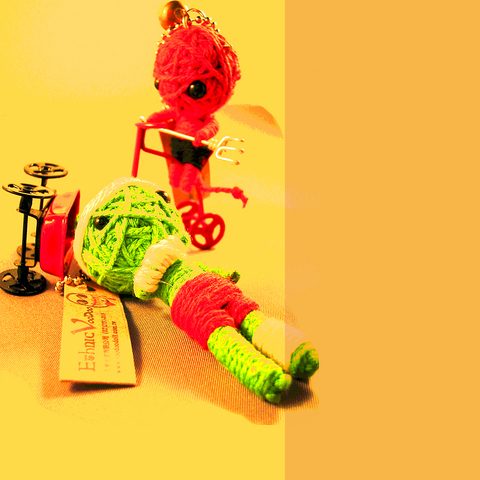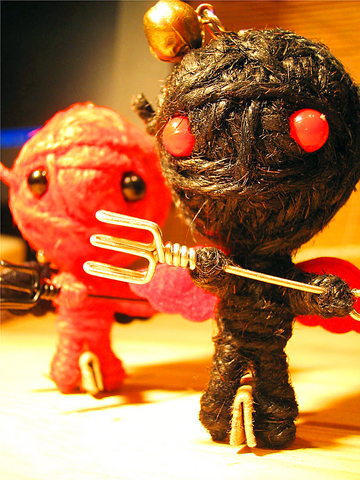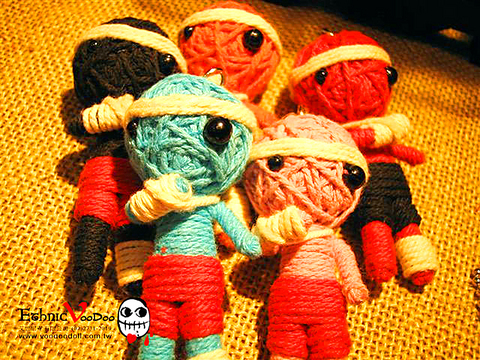It was a dull day in Taipei but behind a Warner Village store window a colorful line of voodoo dolls were hanging on racks. There were mummified babies soaking in formaldehyde jars and voodoo dolls with stitched lips and needles through their hearts, as well as Lucifer, Frankenstein and other monster characters.
Despite the rain, business was good and groups of school-age boys and girls crowded the store. Their eyes gleamed as they pointed at the dolls and asked the store clerk to explain the cursing powers possessed by the figures.
Ethnic Voodoo was set up last October by three 20- to 30-somethings who decided to quit their corporate jobs and open a shop selling ethnic accessories and handmade items from Southeast Asian countries.

The store sounds similar to any one of the myriad of tiny shops that line the bustling alleys off Zhongxiao East Road, but Ethnic Voodoo's three young bosses think otherwise.
"Before we went into business, we spent lots of time and effort on planning and evaluating the location ... Each of us has expertise in different fields. Having worked at a consultancy firm for local enterprises, I have lots of experience of management. Jacky Tsai (
Their efforts seem to be paying off.

PHOTOS COURTESY OF ETHNIC CO LTD
Business picked up within months, and the outlet's success has attracted other entrepreneurs to set up a cluster of similar stores in the same alley, now colloquially known as "Indian Street."
To boost business the team developed new product lines, and discovered an independent design team in Thailand that employs traditional skills to create handmade voodoo dolls.
Ethnic Voodoo's bosses then signed a long-term contract with the design studio for exclusive patent rights in Taiwan. How did they know the dolls would sell?

"Like the Japanese, Taiwanese people have a fetish for collectable merchandise. The Hello Kitty craze taught us what local consumers like to collect. The voodoo dolls are new products not seen before in the market; each of them is given a unique look and characteristic and they are all interrelated under a big family tree. All these features make them highly collectable," Chen said.
The voodoo dolls come in several groups that cater to buyers with different needs. The love series is popular among young lovers and romantics searching for true love.
Little Cupids, Spirit of Love and Heart-Stealing Thief are said to ensure love messages reach their intended target.
The protection series includes a troupe of guardian angels that wards off evil spirits and bring their owners good luck.
Bat Man protects people who have to work at night, while Captain Hook safeguards those who travel frequently.
Ninja Doll is designed to ameliorate bad tempers and impatience, and Monkey King supposedly provides his owner with energy and creativity.
Each doll is woven out of a single section of flax rope, with no other manufacturing process such as gluing or sewing involved. The dolls are brought to life by their given identities.
Consumers are handed detailed information on the ideas behind the creation of the dolls, the powers they possess and their life stories.
The savvy entrepreneurs believe that image-building can enormously enhance their product's value.
"First you have to create a clear and lively image for your products and build up your brand which can separate you from competitors, then consumers are more likely to identify with the brand. From there, you can gradually build a loyal fan base" Chen said.
So far the team has developed nearly 80 variations of the dolls and new items are introduced on a monthly basis.
"The products are also practical, they can be used as key rings," Chen said.
"When asked if the dolls really have magic powers, we always emphasize the creativity of the product, rather than its actual effects. But lots of customers have come back to tell us how the dolls helped them to get their old lovers back or protected them from accidents. They seem to believe the dolls really work," Chen said with a smile, "that's how powerful the dolls can be."
Ethnic Voodoo
Where: 16-18, Songshou Rd, Taipei (台北市松壽路16-18號) and 168, Zhongxiao E Rd, Sec 4, Taipei (台北市忠孝東路四段168號).
For more information: Call (02) 2723 5420 for Songshou store and (02) 87731217 for Zhongxiao store. Or visit www.voodoodoll.com.tw

Climate change, political headwinds and diverging market dynamics around the world have pushed coffee prices to fresh records, jacking up the cost of your everyday brew or a barista’s signature macchiato. While the current hot streak may calm down in the coming months, experts and industry insiders expect volatility will remain the watchword, giving little visibility for producers — two-thirds of whom farm parcels of less than one hectare. METEORIC RISE The price of arabica beans listed in New York surged by 90 percent last year, smashing on Dec. 10 a record dating from 1977 — US$3.48 per pound. Robusta prices have

A dozen excited 10-year-olds are bouncing in their chairs. The small classroom’s walls are lined with racks of wetsuits and water equipment, and decorated with posters of turtles. But the students’ eyes are trained on their teacher, Tseng Ching-ming, describing the currents and sea conditions at nearby Banana Bay, where they’ll soon be going. “Today you have one mission: to take off your equipment and float in the water,” he says. Some of the kids grin, nervously. They don’t know it, but the students from Kenting-Eluan elementary school on Taiwan’s southernmost point, are rare among their peers and predecessors. Despite most of

The resignation of Taiwan People’s Party (TPP) co-founder Ko Wen-je (柯文哲) as party chair on Jan. 1 has led to an interesting battle between two leading party figures, Huang Kuo-chang (黃國昌) and Tsai Pi-ru (蔡壁如). For years the party has been a one-man show, but with Ko being held incommunicado while on trial for corruption, the new chair’s leadership could be make or break for the young party. Not only are the two very different in style, their backgrounds are very different. Tsai is a co-founder of the TPP and has been with Ko from the very beginning. Huang has

A few years ago, getting a visa to visit China was a “ball ache,” says Kate Murray. The Australian was going for a four-day trade show, but the visa required a formal invitation from the organizers and what felt like “a thousand forms.” “They wanted so many details about your life and personal life,” she tells the Guardian. “The paperwork was bonkers.” But were she to go back again now, Murray could just jump on the plane. Australians are among citizens of almost 40 countries for which China now waives visas for business, tourism or family visits for up to four weeks. It’s